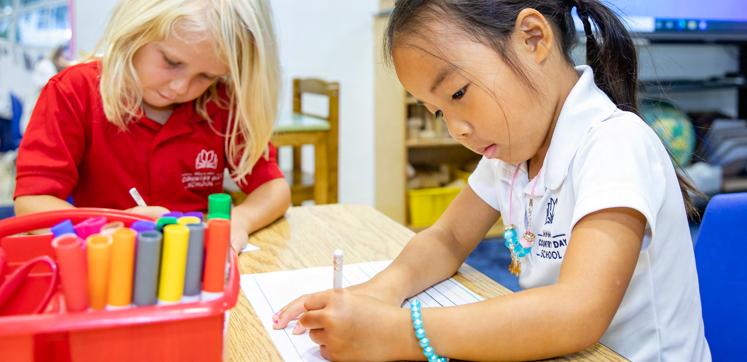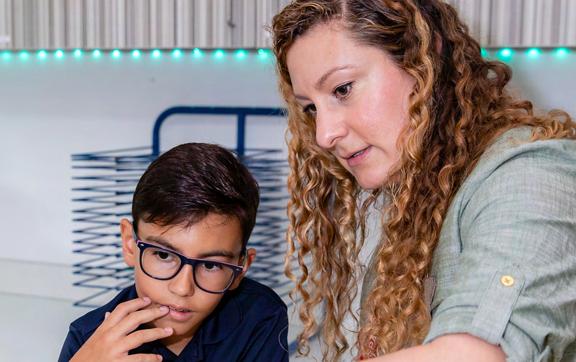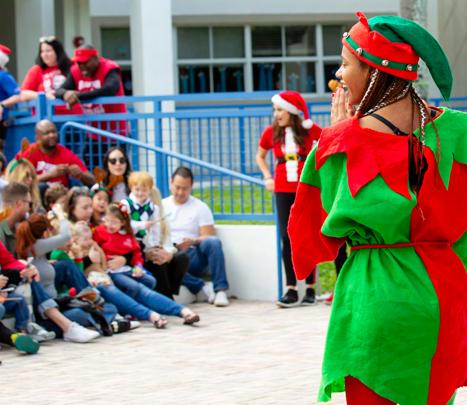
LOWER SCHOOL
ACADEMIC OFFERINGS AND REQUIREMENTS



ACADEMIC OFFERINGS AND REQUIREMENTS

Language Arts: Using the Sciences of Reading, students across all grade levels develop reading, writing, comprehension and critical thinking skills. Teachers guide students to reach their highest potential by differentiating reading texts and literacy strategies that support the development of fluency, and comprehension. Our youngest students learn best through a multisensory and joyful approach to reading and writing. Young learners build an excitement for literature by listening to stories, creating their own stories, and retelling their favorite stories to build their recall and sequencing skills. While working in small guided reading groups, each student begins their literacy journey with specific phonetics and handwriting instruction, while exploring story and nonfiction elements in their classroom texts.
Our students continue to build their strong literacy foundation throughout their eight years in the Lower School through differentiated instruction, guided reading, and writing workshop practices to learn age-appropriate grammar, decoding, writing structure, phonics, complex vocabulary, descriptive language, and research skills. Students learn how to write across genres and use text evidence to support their ideas as they engage in complex literary discussions that include analyzing author’s purpose, vocabulary choice, sentence structure, and the thematic ideas found in fiction and non-fiction texts. Our fifth grade students move on to middle school understanding the power of communication and are prepared to be eloquent speakers and writers, as they use language to persuade, inform, and inspire in all subjects.






Students make meaningful connections between mathematical concepts and data and apply their knowledge to authentic problems through an inquiry based approach to learning. You can find our youngest students exploring numeracy and quantitative reasoning in centers and in small groups while subitizing and part/whole relationships. Our older students can be found having complex conversations filled with mathematical vocabulary, determining multiple strategies to solve algebraic equations, and applying math concepts to engineering and design challenges in the classroom and our Innovation Center. All of our MCDS mathematicians develop the mathematical language, strategic problem solving skills, and the ability to persevere in order to solve complex word and data problems. Differentiated instruction and enrichment ensures every student reaches their full mathematical potential.





Students of every age learn to be environmental stewards and put their scientific knowledge into action by developing a deep understanding of the interconnected ecosystems and the diversity of animals and plants that coexist in Miami and beyond the Florida shores. Our Abess Center for Environmental Science (ACES), Greenhouse, and Comprehensive Outdoor Education Program (COEP) provide opportunities for students to have hands-on experiences planting and nurturing native and exotic flora and fauna, learning about natural habitats, and caring for all animals. Students continue their scientific education in the classroom and Garner Center for Innovation where their cross-curricular STEAM experiences allow students to make connections between physical and earth science concepts through design and engineering challenges using 3D printing, AR, VR, robotics, and coding technology.
Over their eight years in Lower School, students develop a deeper understanding of themselves and those around them through thematic exploration and study using the eight strands of social studies. Students develop a strong sense of belonging and skills to create belonging for others by exploring windows and mirrors experiences. This allows them to see themselves reflected in their curricular experiences, while gaining insight into the cultures, communities, and traditions of those in their immediate family and classroom communities, as well as in Miami and around the globe. Students develop a strong knowledge of connections between geography, government, citizenship, economics, history, and culture, and become compassionate global citizens.


7:40- 8:15 Students arrive to campus
Choice Time
Students experience a warm transition from home to school. They connect with their teachers and classmates while making student-driven play choices from a variety of opportunities teachers have intentionally planned. Play choices strengthen creativity, fine motor skills, problem-solving skills, communication, flexible thinking, perseverance, and social connections.
Classroom community is created while emphasizing social, emotional, math, and literacy skills through morning meeting. A focus on building connections is explored through guided greeting, sharing, and connection activities.
Teachers guide small groups of students in exploratory learning to grow specific skills within their units of study. Small groups allow for differentiation, conversations, trial and error, investigation, innovation center lab work, and classroom celebrations.
Students build healthy dining habits while sitting in small groups in their classroom. Teachers model manners, support appropriate table conversations, and students are encouraged to expand their palate.
Enrichments
Students have one or two enrichment experiences a day to stretch their minds, muscles, understanding of nature and animals, self-regulation skills, and rhythms.





Students have a variety of recess areas to challenge their gross motor skills, creativity, and connection with peers through self-directed play on one of five playground spaces in the Lower School. Students engage with large block play, running games, imaginative play, and climbing on our many play structures.
Developmentally appropriate planned time for students to have independent quiet time to recharge their bodies and minds.
Students enjoy a snack packed from home and then close the day as a class by reflecting on learning and celebrating special moments from the day.
2:30 Staggered dismissals begin



7:40-8:00 Students Arrive on campus
1st-5th grade students and teachers come together as a larger community to celebrate school values, establish positive school norms, share celebrations of learning, set positive intentions, and give students a place to lead.
Classroom community is developed as well as academic and social and emotional skills. A focus on building connections, listening compassionately, and developing a global perspective is explored through guided greeting, sharing, and connection activities.
Students enter into their math time by solving problems and talking about their mathematical thinking. Teachers guide student inquiry by scaffolding and differentiating math instruction so that each student is challenged to develop their mathematical understandings.
Enrichments
Art, Music, ACES, PE, Innovation Center, and Library
Every day students experience a variety of different learning environments to support whole child development and make connections across learning domains.
Students choose from our daily entrees and salad bar. Fifth grade students also visit the Bistro for smoothies and paninis. Conversations with friends and connections across the grade are a priority.





Teachers build literacy skills through small group and large group instruction focusing on Guided Reading, Book Clubs, Writing Workshop, phonics, and handwriting. Students develop strong comprehension and compositional skills through units of study across descriptive, expository, persuasive, and narrative genres.
Students have a variety of recess areas to challenge their gross motor skills, use their imagination, and build connections with peers.
Language skills and global perspective are developed with consistent classes for our Spanish Speakers and Spanish Learners.
Specialized units are created by our teachers to build experiences and real-life connections with science concepts and develop knowledge of connections between geography, government, citizenship, economies, history, culture, and being compassionate global citizens.
Students close the day by reflecting on their learning and special moments from the day with their peers and teacher. Goals for the next day are shared.
2:50 Students dismiss to clubs, extended day, bus, and carline



By understanding the basics of motor skills and movement patterns needed to perform physical activities, students will realize and appreciate physical activity for health, enjoyment, self-expression and social interaction. Lower school students have formal physical education classes two times a week. Beginning in 5th grade students are required to purchase and wear a physical education uniform on days they have physical education
As the basis to all Lower School Art classes, students learn to utilize the Elements of Art and Principles of Design to create and analyze artworks. Our Early Childhood students explore and create art in their homeroom spaces and starting with SK5 students all the way to 5th grade, our student artists make weekly visits to the splendid studio space to engage creatively in the process of artmaking and art appreciation. The skills and knowledge that students gain through exploring a variety of materials during the creative process and learning art techniques through modeling carries on well beyond the art studio. Even in the initial act of drawing up sketches, one can see that a piece of artwork requires thought, planning, effort, and revision, not to mention other transferable skills such as: hand eye coordination, problem- solving, communication, collaboration, concentration, and decision making. Students may find that art helps make learning relevant by giving them a medium to connect new knowledge to personal experiences and a means to express what they have learned. The sharing and discussion of different subjects, artists and artistic styles creates awareness of their cultural, environmental influences, and history. This in turn, establishes a foundation of self-awareness about their own interests and preferences in art for years to come.
Lower School Music engages every student from PK3 through Fifth Grade in singing, playing instruments, and movement. Basic elements of music, and an appreciation for the cultures from which it stems are learned as students gain listening and performing skills. Students explore xylophones, recorders, ukuleles, keyboards, African drums, string orchestra instruments, rhythm instruments, vocal techniques, and performance skills throughout their music experience in Lower School. Lower School music equips students with foundational musical knowledge in preparation for Middle and Upper School music classes and performance ensembles.






Students of every age learn to be environmental stewards and put their scientific knowledge into action by developing a deep understanding of the interconnected ecosystems and the diversity of animals and plants that coexist in Miami and beyond the Florida shores. Our Abess Center for Environmental Science (ACES), Greenhouse, and Comprehensive Outdoor Education Program (COEP) provide opportunities for students to have hands-on experiences planting and nurturing native and exotic flora and fauna, and learning about natural habitats. Students continue their scientific education in the classroom and Garner Innovation Center where their cross-curricular STEAM experiences allow students to make connections between physical and earth science concepts through design and engineering challenges.
Students in every grade learn what it means to use their voice for good, how to advocate for themselves, respect the needs of others, and solve conflicts with positivity. Students understand how to make “good fit” friend choices and be an active creator of belonging for themselves and others in the Spartan community. By fifth grade, students have become the “Leaders of Lower School” and are upstanders for our core values and school expectations. Fifth Grade leaders are eager to be morning greeters who welcome our early childhood learners with a warm smile, hello, or high five. In the words of our fifth graders, “we make sure we say hi to each student and get them to their classroom safely and on time.”
The Lower School goal is for students to build and strengthen Spanish reading, writing, listening and speaking skills through a scaffolded Spanish curriculum, as well as exploration and celebration of Hispanic Culture, reading well known books in Spanish, and engaging in creative dramatization. Developing Spanish speaking, reading, and writing skills begins in our Early Childhood program where each homeroom classroom has one adult Spanish speaker that supports and models the development of new Spanish language skills or enriches the home language development. We have a bilingual Art, Movement, Yoga and Mindfulness program that our youngest learners experience multiple times a week which is led in both Spanish and English. Our first through fifth grade students participate in regular Spanish classes. Our first graders stay in their homeroom learning community as they develop and strengthen their Spanish speaking and listening skills. In second grade students begin receiving differentiated instruction as a Spanish Speaker or Spanish Learner.



In the Garner Center for Innovation, students and teachers work to bring hands-on, design, and interactive projects to life using design thinking principles. The focus is on experiential, project-based learning; students create a final product to culminate lessons learned in the classroom. The (GCI) is an ideation space for collaboration and brainstorming, with three makerspace laboratories equipped with diverse materials for a variety of projects and technology, including 3D printers, laser cutters, a large format printer, a Virtual Reality Studio, a woodworking studio, and much more. The GCI, provides students and teachers a cutting edge environment, to create engaging, experiential, and project based learning opportunities PK3-12. In the Innovation Center, students begin to learn about robotics and programming starting with students in PK3. As students’ progress through the grades they move from directional and color coding programming to block coding with our Dot, Dash, and Arduino based Robots.





LOWER SCHOOL CLUBS OVERVIEW At Miami Country Day School, a child’s experience in the After School Club Program is very important to their development.. Lower School Clubs enable students to discover their potential in various settings beyond the classroom while learning new hobbies, interests, and possibilities. Our After School Clubs are designed for Lower School students to participate in an organized afterschool activity from dismissal until Monday-Friday. Each club is taught by a professional and is geared toward enhancing your child’s overall school experience.
EXTENDED CARE OVERVIEW This program offers supervised childcare for all Lower School students five days a week after the regular school day. It may be used regularly or as the need arises. The program begins immediately following dismissal and concludes at 6:00 pm. Students are also welcome to join the program at the conclusion of their afterschool activities (LS Clubs, chorus, tutoring, etc.)
SSN OVERVIEW Our Student Success Network (SSN) offers a broad range of tutoring services. It is designed to enhance opportunities for students to achieve success. The network employs highly specialized tutors (academic, music, language, etc.) who possess the magic and skill required to transform complex concepts into understandable ideas.
SPARTAN BUS OVERVIEW Spartan Bus is a safe, reliable, and comfortable bus transportation service offered by Miami Country Day School to every student five days a week after the regular school day. The Spartan Bus is run by MCDS employees exclusively for our students to ensure that our students and parents have the best experience possible by providing the following features:
State Certified Bus Drivers
On-Board Safety Coordinators
New Buses and Vans
Camera Surveillance Systems
GPS Tracking provided by MCDS Security
Electronic student Check-in system
Automatic notification of boarding and drop off




















Every Student. Everyday. Everywhere.